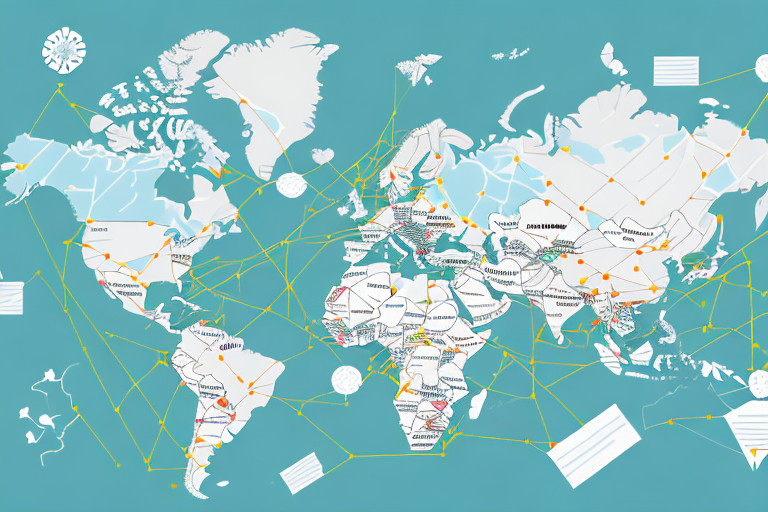In today’s interconnected world, economic sanctions have become an integral tool in the realm of international politics. One particular type of sanctions that has gained prominence in recent years is sectoral sanctions. These targeted measures aim to influence the behavior of specific industries or sectors within a country, rather than targeting the entire economy.
Understanding the Basics: What are Sectoral Sanctions?
Sectoral sanctions are a form of economic restrictions imposed by governments or international organizations on a targeted country or entity. Unlike comprehensive sanctions that encompass various economic sectors, sectoral sanctions focus on specific industries that are deemed to have significant ties to the country’s policies or actions of concern.
In order to effectively implement sectoral sanctions, it is essential to identify the high-impact sectors that will exert the most pressure on the target. These sectors are carefully chosen based on their economic significance and their potential to influence policy or behavior.
One key advantage of sectoral sanctions is their ability to target specific industries without causing widespread economic harm. By focusing on industries that are closely linked to the target country’s policies or actions, sectoral sanctions can exert pressure on the government or entity without negatively impacting the entire economy.
Furthermore, sectoral sanctions can be designed to minimize unintended consequences. Unlike comprehensive sanctions that may affect innocent civilians or non-targeted industries, sectoral sanctions can be tailored to avoid collateral damage. This targeted approach allows for a more nuanced and strategic use of economic restrictions.
Exploring the Purpose and Objectives of Sectoral Sanctions
The primary objective of sectoral sanctions is to impose economic pressure on a target to achieve specific political or policy outcomes. By targeting key industries, these sanctions aim to disrupt the functioning of sectors crucial to the target’s economy, thereby compelling the government or entity to change its behavior.
Sectoral sanctions may be used to discourage human rights abuses, prevent the proliferation of weapons of mass destruction, or address other concerns related to national security, territorial integrity, or international norms and standards. The specific purposes of imposing sectoral sanctions can vary depending on the context and the desired objectives of the imposing entity.
For example, sectoral sanctions may be imposed to address environmental concerns, such as the illegal logging of protected forests or the unsustainable extraction of natural resources. By targeting industries involved in these activities, sanctions can put pressure on the target country or entity to adopt more sustainable practices and protect the environment.
Key Players in Implementing Sectoral Sanctions: Governments and International Organizations
The imposition and enforcement of sectoral sanctions involve multiple key players, including governments and international organizations.
Governments play a crucial role in formulating and implementing sectoral sanctions. They determine the specific target sectors and design the sanctions measures accordingly. Additionally, governments leverage their diplomatic and economic influence to rally international support for the imposition of sectoral sanctions.
International organizations, such as the United Nations, the European Union, and regional bodies, also play a significant role in implementing sectoral sanctions. These organizations coordinate efforts between member states, monitor compliance, and provide a platform for dialogue and negotiation to resolve conflicts or address concerns without resorting to comprehensive sanctions.
Furthermore, governments often collaborate with each other to share intelligence and coordinate actions in implementing sectoral sanctions. This collaboration helps ensure that the sanctions are effective and have a greater impact on the targeted sectors or entities.
In addition to governments and international organizations, non-governmental organizations (NGOs) also play a role in implementing sectoral sanctions. NGOs often work on the ground to gather information, monitor compliance, and advocate for the enforcement of sectoral sanctions. They provide valuable insights and support to governments and international organizations in their efforts to implement and enforce these sanctions.
Analyzing the Impact of Sectoral Sanctions on Global Trade and Economy
The implementation of sectoral sanctions has far-reaching implications for global trade and the economy. The impact of these sanctions extends beyond the target country, affecting international markets, businesses, and stakeholders.
Sectoral sanctions can disrupt supply chains and trade flows, leading to shortages of goods and services in both target and non-target countries. They can create uncertainty and increase financial risks for businesses operating in targeted sectors, potentially leading to job losses and economic downturns.
Moreover, sectoral sanctions can have unintended consequences, such as market distortions, the emergence of black markets, and the redirection of trade to non-sanctioned markets. The complex interdependencies of the global economy mean that the effects of sectoral sanctions ripple through multiple industries and regions.
One of the key challenges in analyzing the impact of sectoral sanctions is the difficulty in accurately measuring their effects. The indirect and long-term consequences of these sanctions make it challenging to isolate their specific impact on global trade and the economy. Researchers and policymakers often rely on econometric models and data analysis to estimate the effects of sectoral sanctions on various economic indicators.
Furthermore, the effectiveness of sectoral sanctions in achieving their intended goals is a subject of debate. While these sanctions are often imposed with the aim of changing the behavior of the target country, their success in achieving this objective can vary. Factors such as the resilience of the target country’s economy, the presence of alternative trading partners, and the ability of the target country to adapt to the sanctions can all influence the effectiveness of sectoral sanctions.


